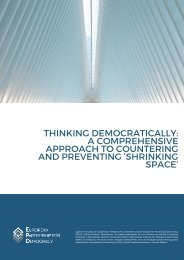Repression and resilience: Diagnosing closing space mid-pandemic
Create successful ePaper yourself
Turn your PDF publications into a flip-book with our unique Google optimized e-Paper software.
REPRESSION AND RESILIENCE: DIAGNOSING CLOSING SPACE MID-PANDEMIC<br />
43<br />
While Indonesia st<strong>and</strong>s out in the region for its vibrant civil society <strong>and</strong> diverse <strong>and</strong> critical press l<strong>and</strong>scape, civic<br />
<strong>space</strong> has been under attack in recent years, <strong>and</strong> this trend further intensified during the p<strong>and</strong>emic. Excessive use<br />
was made of existing laws restricting speech - such as Article 207 of the Criminal Code, which penalises insulting the<br />
President - to silence those who were critical of the government’s response to the p<strong>and</strong>emic. While the government had<br />
censored <strong>and</strong> criminalised “radical” - read critical - content online by journalists, the p<strong>and</strong>emic saw an upsurge in online<br />
harassment of activists, journalists <strong>and</strong> academics for criticising the government’s p<strong>and</strong>emic response or discussing<br />
other politically sensitive issues.<br />
Whilst media attention was focused on the p<strong>and</strong>emic, the executive acted quickly to pass new legislation bypassing<br />
institutional checks <strong>and</strong> balances. Several pieces of legislation that would have drawn public attention in non-COVID<br />
times were settled under the shade of the p<strong>and</strong>emic, with no public consultation or opportunities for feedback by civil<br />
society or citizens. Many of these laws had no relation to the p<strong>and</strong>emic, such as a coal mining law as well as an omnibus<br />
law affecting 74 other laws which would have major implications on labour unions <strong>and</strong> the ability to demonstrate. While<br />
this phenomenon was greatly criticised by the public, political actors continued to pass legislation at this speed without<br />
consultations. Political parties continue to be the main perpetrators of attacks on democratic <strong>space</strong>.<br />
Venezuela<br />
While the opposition movement in Venezuela had great momentum in January 2020 following a year of sustained<br />
protests by the main opposition party, the lockdown paralysed the protest movement <strong>and</strong> legitimated the authoritarian<br />
rule of President Maduro. The emergency powers decreed to face the p<strong>and</strong>emic have meant no significant change in<br />
the authoritarian workings of the country, but they have helped President Maduro to display relative power <strong>and</strong> control,<br />
projecting an image of apparent stabilisation to a very vulnerable population. While a shadow parliament had already<br />
been operating virtually on limited resources with legislators in exile, the pro-government parliament remained out of<br />
session for most of the year as its members campaigned for elections in late 2020. Together with the partiality of the<br />
Supreme Tribunal of Justice, these conditions further limited checks <strong>and</strong> balances.<br />
Even before the p<strong>and</strong>emic, civic <strong>space</strong> had endured a decade of attacks, targeted particularly at protesters, journalists<br />
<strong>and</strong> media outlets. Media outlets <strong>and</strong> specific journalists have been subjected to police searches, persecution <strong>and</strong><br />
violence, <strong>and</strong> a number of restrictive laws were adopted. The p<strong>and</strong>emic was used to justify the arrest of over 35<br />
journalists, charged with circulating information on the virus contradictory to official reports, while many others were<br />
detained <strong>and</strong> accused of anti-government conspiracies, <strong>and</strong> two journalists were killed. Online civic <strong>space</strong> was also<br />
controlled through connectivity disruptions, the deployment of digital agents to manipulate public opinion, <strong>and</strong> stateled<br />
blocking of internet service providers used by NGOs <strong>and</strong> news outlets.<br />
Several protests continued to take place during the lockdown, but they were mostly isolated <strong>and</strong> focused on public<br />
service provision, education <strong>and</strong> health issues, rather than political reform. Excessive police force was used against<br />
protesters during the p<strong>and</strong>emic, including the use of firearms <strong>and</strong> tear gas, with many citizens detained, injured <strong>and</strong><br />
subjected to illegal searches <strong>and</strong> seizures of protestors’ homes. Over 400 protesters were detained, <strong>and</strong> at least six<br />
extrajudicial killings occurred.<br />
The state impeded the work of the World Food Programme <strong>and</strong> other international aid donors by accusing them of<br />
criminal activities <strong>and</strong> adopting repressive regulations that enforced compulsory registration <strong>and</strong> state surveillance

















